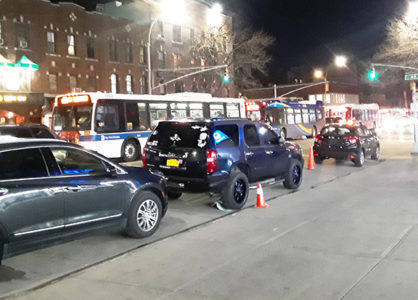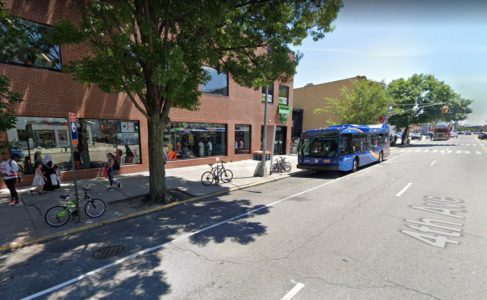Leaders of the Riders Alliance have been riding the subways a lot lately.
With the April 1 deadline looming to finalize the state budget, members of the group have been riding the rails to push for congestion pricing as part of the state’s spending package.
The Riders Alliance is getting help from like-minded Brooklyn lawmakers who have been accompanying members of the transit advocacy group on train rides to hand out ridership surveys and talk to straphangers about congestion pricing, the concept of charging motorist a toll to drive into Manhattan to raise money to fund repairs to New York City’s transit system.
U.S. Rep. Nydia Velazquez and Assembly members Mathylde Frontus and Maritza Davila were the latest pols to take a ride to discuss congestion pricing. State Sen. Andrew Gounardes recently rode the R train and talked to riders at the 77th Street station in Bay Ridge to show his support for congestion pricing. Another Brooklyn lawmaker, state Sen. Julia Salazar of Bushwick, also took a subway ride with the Riders Alliance.
Congestion pricing would require state approval.
On Friday morning, Velazquez, a Democrat whose congressional district includes Sunset Park, and Davila, a Democrat who represents Bushwick, met Riders Alliance members at the Lorimer Street and took a ride on an L train. Their fellow Democrat Frontus, who represents Coney Island, Dyker Heights and Bensonhurst, spent time during Friday evening’s rush hour riding the N train.
Frontus called congestion pricing “a last resort option in the face of an emergency vis-à-vis the MTA ‘s budget deficit.”
Some type of action is needed, according to Frontus, who said the riding public is tired of putting up with constant subway delays. “We can’t allow ourselves to do nothing in this situation. I am in favor of a congestion pricing plan that is done responsibly and does not impose a burden on the people that the plan is meant to help,” she told this newspaper.
“It is clear we need additional funding for New York’s public transit and it has become increasingly evident that congestion pricing will likely need to be part of the equation,” a spokesperson for Velazquez told this newspaper.
Velazquez is keeping an open mind on congestion pricing, according to the spokesperson. “Of course, the details of any such proposal will need to be carefully vetted, but given the transportation funding challenges facing our city nothing can be off the table,” he said.
Davila said she’s fully on board. “For the past few months, I’ve been in Albany working alongside my colleagues in the state legislature fighting to pass congestion pricing. This will help to alleviate some of the cost of modernizing the MTA NYCT system, especially important for local transit riders who are concerned about the fare hike and the need for public transit repairs,” she said in a statement.
The elected officials distributed ridership surveys and chatted with straphangers about their daily commutes. The idea of the trip was to document the depth of the transit crisis for Brooklyn riders and to demonstrate the need for congestion pricing, according to the Riders Alliance.
“Brooklyn subway riders are heavily burdened with extensive delays and inconsistent subway service, made worse by inaccessible stations and unreliable service updates,” said Michael Maskin, who organized the lawmakers’ rides as part of the Riders Alliance’s #FixTheSubway program. “Now more than ever, we need our state elected officials to pass a fair, progressive and sustainable funding plans that will improve the commutes and accessibility for all Brooklyn public transit riders.”
Gounardes, who is a member of the Riders Alliance, said something has to be done. “The status quo is beyond unacceptable,” he said recently.
But many riders are skeptical of congestion pricing even though they admit that the city’s transit system is badly in need of upgrades and repairs.
“I believe we pay enough taxes. This is like another tax,” one woman said at a recent forum sponsored by Republican Assemblymember Nicole Malliotakis in Bay Ridge.
A man in the audience who listened as forum moderator Alex Matthiessen discussed the success of congestion pricing in cities like London and Stockholm, said he wasn’t impressed. “This isn’t London and it isn’t Stockholm,” he said.

 Heavy winds create Verrazzano traffic nightmare
Heavy winds create Verrazzano traffic nightmare  Morning bus layover proposed at busy S79 stop
Morning bus layover proposed at busy S79 stop